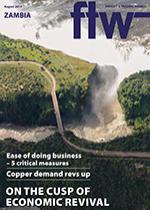Political instability in Zambia and its neighbours – the Democratic Republic of Congo, Zimbabwe and Zambia – could delay economic recovery for the country.
It has a direct impact on business confidence, with both local and foreign companies holding back on plans to invest in the country.
Long seen as being politically one of the more stable governments in Africa, Zambia is seen by a number of commentators as approaching dictatorship.
President Edgar Lungu has jailed the leader of the opposition, Hakainde Hichilema, essentially for cutting off the convoy of president Edgar Lungu.
The speaker of the Zambian National Assembly, Patrick Matibini, also suspended 48 opposition legislators for 30 days as a punishment for unauthorised absence from the parliament – they boycotted Lungu’s state of the nation address in protest against what they see as questionable election results.
There is a possibility that the political impasse will influence a decision by the International Monetary Fund (IMF) to grant Zambia up to US$1.3 billion in a three-year credit facility to cover a 7% budget deficit. An announcement is expected this month (August).
Volumes of freight into and out of the DRC are also not realising full potential due to concerns over repetitive delays to elections, which were due to have been held this year. President Joseph Kabila is seen to be attempting to hold onto power through the delays.
There has been no democratic transfer of power in the DRC since independence from Belgium in 1960.
Sporadic instability in northern Mozambique where Renamo is claimed to be attacking trains and trucks also has an impact on logistics, as shippers choose what they see as less risky routes.

